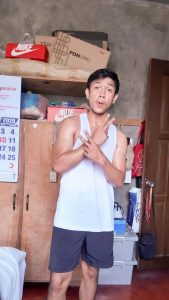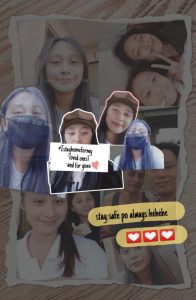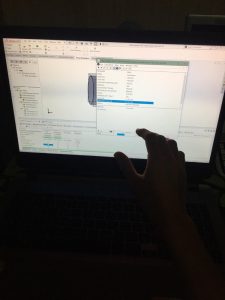After months in quarantine, we have seen how the COVID-19 pandemic has drastically affected the way we do things. We’ve seen it with small businesses struggling to stay afloat. We’ve seen it in the employees getting laid off and receiving lower salaries. We’ve seen it in the way people are interacting with their family, friends and colleagues–physical distancing, Zoom calls, to the extent of doing away with the usual hugs and shaking of hands.
At PhilDev, our office has gone virtual. We have moved all our activities online from our Social Impact Accelerator to our scholarship program activities. It has been challenging for us not being able to physically interact with our colleagues and our stakeholders, but we make sure to always keep in touch to remind them that we are here for them during this uncertain time. We continue with our regular check-ins with scholars, especially since they too have been greatly affected by the pandemic.
When the national government implemented the enhanced community quarantine last March 15, many universities have either started shifting their activities online or ended their academic year earlier than usual. As we have partner-universities all over the country, we see a glimpse of how the struggle looks on the ground. Our scholars have also been coping with the disruption brought about by the pandemic. How are they keeping up?
Catching up with one’s self and reigniting passions

“With a lot of time in our hands, I did things I’ve always wanted to do when we were busy with our everyday ‘normal life’. As of now, knowing that we were given “Passed” grades, morning will be workout time, playing computer games or watching movies will be my afternoon-night routine.”
This is what the new normal looks like for Michael Arellano, one of our scholars from Mindanao State University – Iligan Institute of Technology (MSU-IIT). Michael is an Electrical Engineering student who was in the process of finalizing his thesis when the pandemic struck the country. As he is in his fifth year, Michael spent most of his time thinking about his school requirements and deadlines when everything was still “normal”. When MSU-IIT started suspending classes, Michael tried to figure out how he would go about his remaining tasks at school. He was also overwhelmed at first with the amount of free time he had. Eventually, he developed a routine that allowed himself to stay active and entertained despite staying at home most of the time.
Distressing by watching Korean drama series and movies is Hannie Mae Jason’s way of spending her free time while in quarantine. Hannie is a Mechanical Engineering scholar also from MSU-IIT. Like Michael, she was also working on her thesis when the pandemic disrupted everything. Although she continues to conduct her research remotely, she feels more relaxed with the submissions and deadlines now that she is staying at home. Aside from keeping herself entertained binge-watching K-dramas, Hannie is also watching exercise tutorials on Youtube to stay active—something most of us can probably relate with.
A time for self-development is how Lenard Basinga, an Agricultural and Biosystems Engineering scholar from Central Luzon State University (CLSU), spends his new normal. For Lenard, optimizing his free time is the best way to go. Fueled by curiosity, he started learning various things that would expand his knowledge and skills. Aside from that, Lenard also took this opportunity to take a break from social media and from the overwhelming news about the crisis to look after his mental well-being. According to Lenard, he keeps a Growth Journal in which he regularly writes down his reflections about the lessons he learned to satisfy his curiosities and craving for new knowledge.
“I enrolled in an online course about Carbon Capture and Storage. I optimized my time by watching educational videos on YouTube and reading educational threads on Reddit. I also just started reviewing for the board exams though it’s still quite early. On top of that, I also started learning the Japanese language and Python programming just a week ago,” Lenard shared enthusiastically.
Learning in the new normal and beyond
Remote learning was once simply an option for students before the pandemic. But now, it’s at the forefront of almost every university’s plan for the new normal. Our scholars had a glimpse of this learning experience when strict quarantine measures were not yet implemented. What were the challenges they faced learning online?

Access to internet connection
Having access to stable internet connection is one of the leading concerns of our scholars. Many of them have slow and unreliable internet connectivity which makes it challenging for them to complete their school requirements. Some of them have to stay up late or wake up before dawn to conduct online research for their assignments or thesis.
“We don’t have internet access at home so I rely on [mobile] data promos when submitting my requirements in school,” shared Kreeshan Villas, one of our scholars from Cebu Technological University (CTU). This is an experience she has to go through in the new normal when schooling shifts online. But access to the internet is not only her problem. Reliability in internet connection is also affecting her productivity.
“Stable connection is also dependent on time of day. Most of the time, my internet connection is stable at dawn. If I’m lucky, it would also be stable early morning or late afternoon,” Kreeshan added.

Conducive learning spaces
Under the new normal, homes become the new classrooms. Students are now expected to access learning content and materials within their homes through their computers or smartphones. Experts suggest designating a space for learning at home to ensure that students are focused and productive while studying. How does this look like in reality?
For our scholars who are mostly taking courses in the STEM (Science and Technology, Engineering, Mathematics) field, their homes may not exactly be the best place to conduct experiments. Many of our scholars are working on their thesis and are in the midst of conducting experiments. With facilities and equipment unavailable, some of them have to adjust their work.
“Our thesis has to change drastically because the experiments can’t be done at home. Deadlines await us, so we just made new assessments for our thesis. It saddens me because we put a lot of work and money in doing our thesis,” Nicolai Celo, one of our scholars from University of Santo Tomas, shared.
Hannie is also facing similar challenges with her thesis. She shared that she is currently designing and conducting simulations for her research which requires a computer fast enough to run her programs smoothly. Before the pandemic, she can easily access their university’s computer laboratory to run her programs. But because of the lockdown, the laboratory became unavailable for use. This makes it challenging for Hannie not only because she needs to conduct her thesis at home, but also because she is only using her personal laptop to conduct her experiments.
Aside from equipment problems, it should also be noted that the scholars are not only students at home. They also perform other roles in the household, and the boundaries between each role is becoming blurry under the new normal. Kreeshan, for example, also has to look after her little sister and do her chores during the day before studying. Lloyd Quilongquilong, a BS Electrical Engineering scholar from Cebu Technological University (CTU), has also been hands-on in helping his parents in their family business. These are important considerations as students face the new normal.
Finishing amid challenges
“I have to stay focused on becoming the best version of myself until I can actually do something that could reduce the impact of these bleak situations in the future.”
– Lenard Basinga, BS Agricultural Biosystems Engineering, Central Luzon State University (CLSU)
New challenges surfaced when the global pandemic hit the country. For the scholars, they may not be able to go back to their universities while the world searches for a viable vaccine. They may not be able to physically meet up with their friends, classmates, and professors following physical distancing protocols. As for their experiences with PhilDev, they may not be able to experience their annual leadership camp—at least physically. Despite these setbacks, the scholars are still driven to finish strong.
“My daily motivation is to be a better person than I was yesterday. For a specific goal, finishing our thesis would be my top-most goal and after that, passing the board exams,” shared Michael. As much as he spends time playing computer games over the quarantine period, Michael keeps his eyes on the prize and continues to work hard to achieve his dreams.
For Hannie, being able to help her family and people in need is what motivates her to do her best as a student. “My goal is to help my family and other people in need. I really want to graduate on time, find a job, and earn enough income in order for me to give back to the people. Because that’s what makes me happy,” she shared.
Lenard, on the other hand, motivates himself by imagining how he can be a force for positive change in the future. “I’ve read in one e-mail this quote: “While we’re all in the same storm, we’re not all in the same boat.” To me, that statement speaks volumes. I have to stay focused on becoming the best version of myself until I can actually do something that could reduce the impact of these bleak situations in the future.”
—
We may all be experiencing tougher and more uncertain times today because of the global pandemic. But we do not have to go through this alone, as we always say. As part of our support to our scholars, the PhilDev Scholarship team continues to be present in the scholars’ lives whenever they need guidance or clarity in terms of navigating these times through their check-ins. Aside from that, we are also working closely with our partners to ensure that we continue providing our scholars the holistic development they need even if it means doing it virtually.
Our mission to enable success continues!
—
